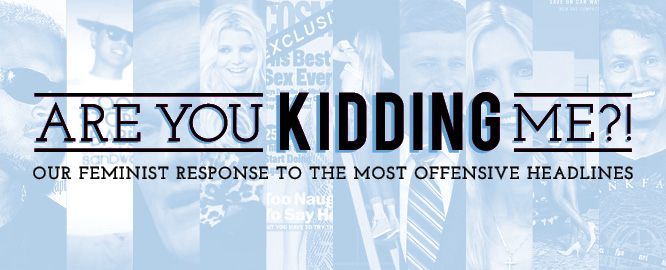
Are You Kidding Me?!
A hit song and music video came to our attention recently and sickened us so much with its racism, objectification of women’s bodies, and exploitation of rape imagery for ‘humour’ and ‘thrill value’ that we don’t even want to name the song here. We want to interrupt rather than promote the song’s appalling rise up the charts.
At the same time, this song reminded us of the larger culture of sexism and racism in music videos and the need to critique and resist those toxic influences. While misogynistic music videos are a form of violence in their own right, they also encourage ways of seeing women that lead to physical violence. When we view women as assemblages of sexualized body parts rather than as full human beings with inherent value, it becomes easier to enact misogynistic violence.
So, instead of posting the video that has us all screaming “Are you kidding me!?!,” we’ll share some links to films critiquing the systems of oppression in popular music culture.
First of all, here’s a link to Dreamworlds III, a documentary about sexist violence in music videos. Keep in mind that the first version of Dreamworlds was made more than 20 years ago, and there’s still no shortage of misogynistic garbage to critique. If anything, the sexist imagery just gets more and more brutal and gratuitous as the creators of videos attempt to pass it off as cutting-edge and novel. In reality, it’s the same pile of stinking, festering, putrid slime as two decades ago—just a bigger pile.
Here is a film called Hip-Hop: Beyond Beats & Rhymes that criticizes the construction of violent masculinity in hip-hop music and the racist power structures that govern the industry and frame popular perceptions of black musicians as violent and sexist.
And if you think hip-hop is the worst offender for sexist lyrics, are you kidding me?!?! Think again. This blog showcases the rampant misogyny in non-hip hop music genres.
But it doesn’t have to be this way. We are constantly inspired by the handful of mainstream musicians who are taking creative risks in their song lyrics and working for social justice. Case in point: Macklemore and Mary Lambert’s “Same Love” speaks out against homophobia and calls on listeners to make a change in themselves and their communities. Social change becomes more possible when we are not swimming against the current of a popular music culture that glorifies injustice and violence. Let’s keep creating and supporting positive art and music and refusing to consume the toxic bile that our radios and TV’s keep spewing.
- On June 7, 2013

